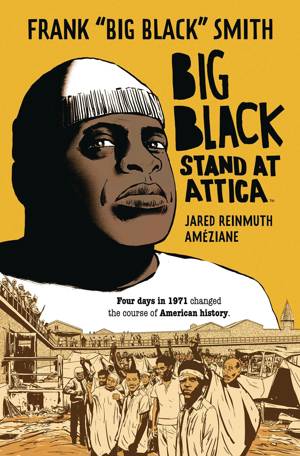
- Afhalen na 1 uur in een winkel met voorraad
- Gratis thuislevering in België vanaf € 30
- Ruim aanbod met 7 miljoen producten
- Afhalen na 1 uur in een winkel met voorraad
- Gratis thuislevering in België vanaf € 30
- Ruim aanbod met 7 miljoen producten
Zoeken
€ 27,95
+ 55 punten
Omschrijving
A graphic novel memoir from Frank "Big Black" Smith, a prisoner at Attica State Prison in 1971, whose rebellion against the injustices of the prison system remains one of the bloodiest civil rights confrontations in American history. FOUR DAYS IN 1971 CHANGED THE COURSE OF AMERICAN HISTORY. THIS IS THE TRUE STORY FROM THE MAN AT THE CENTER OF IT ALL. In the summer of 1971, the New York's Attica State Prison is a symbol of everything broken in America - abused prisoners, rampant racism and a blind eye turned towards the injustices perpetrated on the powerless. But when the guards at Attica overreact to a minor incident, the prisoners decide they've had enough - and revolt against their jailers, taking them hostage and making demands for humane conditions. Frank "Big Black" Smith finds himself at the center of this uprising, struggling to protect hostages, prisoners and negotiators alike. But when the only avenue for justice seems to be negotiating with ambitious Governor Nelson Rockefeller, Big Black soon discovers there may be no hope in finding a peaceful resolution for the prisoners in Attica. Written by Jared Reinmuth and Frank "Big Black" Smith himself, adapted and illustrated by Ameziane, Big Black: Stand At Attica is an unflinching look at the price of standing up to injustice in what remains one of the bloodiest civil rights confrontations in American history. Praise for Big Black: Stand at Attica
"The stellar artwork by Améziane (Muhammad Ali) includes tabloidlike chapter openers rendered with bold fonts and exaggerated letterboxes. His expressive realism and muted colors invoke a nostalgic 1970s pulp effect reminiscent of Ed Piskor's work. This penetrating portrait of a broken correctional system and a flawed man focuses on his legacy of courage, which towers over the forces stacked against him." - Publishers Weekly, starred review "Ame´ziane's (Muhammad Ali) gritty, expressive illustration and muted color palette present this unflinching depiction of the brutal price the Attica inmates paid for demanding civil rights in a style evocative of the 1970s Hollywood Renaissance aesthetic. Sure to be one of the most discussed books this year."- Library Journal "Seriously, this is a fantastic piece of literature." - Graphic Policy "If you have an interest in history, memoir, social justice, or just the life of a good man in an extraordinary circumstance, you should track down a copy and experience the story directly." - Black Nerd Problems
"The stellar artwork by Améziane (Muhammad Ali) includes tabloidlike chapter openers rendered with bold fonts and exaggerated letterboxes. His expressive realism and muted colors invoke a nostalgic 1970s pulp effect reminiscent of Ed Piskor's work. This penetrating portrait of a broken correctional system and a flawed man focuses on his legacy of courage, which towers over the forces stacked against him." - Publishers Weekly, starred review "Ame´ziane's (Muhammad Ali) gritty, expressive illustration and muted color palette present this unflinching depiction of the brutal price the Attica inmates paid for demanding civil rights in a style evocative of the 1970s Hollywood Renaissance aesthetic. Sure to be one of the most discussed books this year."- Library Journal "Seriously, this is a fantastic piece of literature." - Graphic Policy "If you have an interest in history, memoir, social justice, or just the life of a good man in an extraordinary circumstance, you should track down a copy and experience the story directly." - Black Nerd Problems
Specificaties
Betrokkenen
- Auteur(s):
- Illustrator(s):
- Uitgeverij:
Inhoud
- Aantal bladzijden:
- 176
- Taal:
- Engels
Eigenschappen
- Productcode (EAN):
- 9781684154791
- Verschijningsdatum:
- 18/02/2020
- Uitvoering:
- Paperback
- Formaat:
- Trade paperback (VS)
- Afmetingen:
- 165 mm x 257 mm
- Gewicht:
- 544 g

Alleen bij Standaard Boekhandel
+ 55 punten op je klantenkaart van Standaard Boekhandel
Beoordelingen
We publiceren alleen reviews die voldoen aan de voorwaarden voor reviews. Bekijk onze voorwaarden voor reviews.











